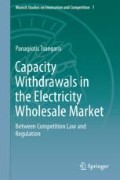Abstract
In electricity wholesale markets market power is mainly exercised either by withdrawing generation capacity (physical withdrawal) or by pricing above competitive levels (economic withdrawal) in order to achieve a higher market price and, thereby, increase revenues. Capacity withdrawal practices can be very harmful for the market and consumers. Thus, the ability of competent authorities to intervene against practices of physical and economic withholding of capacity is crucial. In Chap. 2, the capacity withdrawal practices are put into context and explained and the general background is set out.
You have full access to this open access chapter, Download chapter PDF
In electricity wholesale markets market power is mainly exercised either by withdrawing generation capacity (physical withdrawal) or by pricing above competitive levels (economic withdrawal) in order to achieve a higher market price and, thereby, increase revenues. Capacity withdrawal practices can be very harmful for the market and consumers. Thus, the ability of competent authorities to intervene against practices of physical and economic withholding of capacity is crucial. In Chap. 2, the capacity withdrawal practices are put into context and explained and the general background is set out.
As with any other form of market abuse, physical and economic withholding of capacity are subject to the application of competition law. The requirements to proceed under competition law, and in particular under Article 102 TFEU, are influenced by the specificities of the electricity wholesale markets. In Chap. 3, the issues that arise when proceeding against abusive behaviour under competition law, particularly under Article 102 TFEU, are examined.
Other than the application of competition law to the practices under review, Regulation 1227/2011 on wholesale market integrity and transparency (REMIT) has come into force. The REMIT enhances transparency in wholesale energy markets. The first research question, elaborated upon in Chap. 4, revolves around transparency and, specifically, whether the increase in transparency as provided for in the REMIT and Regulation 543/2013 on submission and publication of data in electricity markets is appropriate in order to facilitate the efficient functioning of electricity wholesale markets and the investigation of capacity withdrawal practices.
In addition to enhancing transparency, the REMIT also prohibits any acts of market manipulation on wholesale energy markets. The second research question, examined in Chap. 5, is whether on account of the fact that competition law will still be applicable, recourse to the REMIT might be necessary to deal with capacity withdrawal practices.
Author information
Authors and Affiliations
Rights and permissions
Copyright information
© 2017 Springer-Verlag GmbH Germany
About this chapter
Cite this chapter
Tsangaris, P. (2017). Introduction and Research Questions. In: Capacity Withdrawals in the Electricity Wholesale Market. Munich Studies on Innovation and Competition, vol 7. Springer, Berlin, Heidelberg. https://doi.org/10.1007/978-3-662-55513-2_1
Download citation
DOI: https://doi.org/10.1007/978-3-662-55513-2_1
Published:
Publisher Name: Springer, Berlin, Heidelberg
Print ISBN: 978-3-662-55512-5
Online ISBN: 978-3-662-55513-2
eBook Packages: Law and CriminologyLaw and Criminology (R0)

